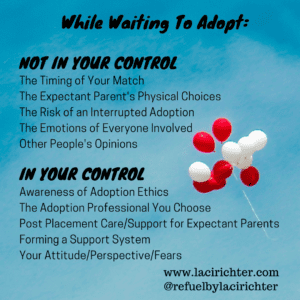Conservatorship & Britney Spears
Todd Gaudin • March 15, 2021
At Gaudin Law Group, we deeply care about the well-being of everyone touched by adoption—birth parents, adoptive families, and especially adoptees. One topic often discussed is the concept of the "primal wound," a term coined by author Nancy Verrier. It refers to the emotional and psychological impact experienced by adoptees as a result of being [...]
The post Understanding Adoption Trauma: The Primal Wound & A Path to Healing appeared first on Gaudin Law Group.
Ask for References: The best way to find a good attorney is by asking for a reference from someone you know. Friends and family can provide referrals to attorneys with whom they’ve had positive experiences. Other attorneys, who may not practice in the specific area you need help with, are also great sources for recommendations. [...]
The post How to Find a Good Attorney appeared first on Gaudin Law Group.
Occasionally (25-45% unscientifically), expectant mothers who first favored adoption decide to parent. Her legitimate choice can emotionally crush prospective adoptive parents (= PAP), more or less, depending on its timing. One of our PAP recently experienced this pain. After getting home from the hospital where she gave birth to a baby girl, a mother who [...]
The post Can Anything Positive Come From a Disrupted Adoptive Placement? appeared first on Gaudin Law Group.
Who can request that the name of a person younger than eighteen (a minor child) be changed?Both parents of a minor child may agree and request to change their child’s name. Or, if a court has awarded one of the parents sole custody, that parent may ask for permission to change his child’s name. If [...]
The post Name Changes in Louisiana appeared first on Gaudin Law Group.
Our state’s and country’s law stiffly protects the right of a parent (a biological or adoptive mother or father) to custody (the authority to make most decisions and accept responsibility, for a minor) of his or her child. It’s likely the most secure right you enjoy as a US citizen. But this right can be [...]
The post How Does a Non Parent Get Legal Custody? appeared first on Gaudin Law Group.
Looking to adopt in Louisiana? Our interview with Todd Gaudin, an adoption attorney in Louisiana, will provide valuable insights into the state's adoption laws, from the legal requirements to the adoption process, what types of adoption are allowed in Louisiana, and how adoption can be handled differently under the law. We cover everything you need [...]
The post Adoption Law in Louisiana appeared first on Gaudin Law Group.
This eighty-eight-year-old, "Clark," "E. Clark," "Mr. G," "Dad," "Pops" departed this life on Thursday, March 19, 2020. He was an attorney for over sixty years, graduating from the LSU Law School in 1958. His jobs included father, attorney, and state representative from former District 69. He was born in New Roads, La. to Vida Swindler [...]
The post E. Clark Gaudin – A Principled Man appeared first on Gaudin Law Group.

Written by Laci Richter Adoptive Mom & Author of Refuel Your Wait When my husband and I started the process of adoption, I thought that we were finally in control of building our family. After years of trying to conceive and unsuccessful medical treatments, we were now going to have control over the outcome. When [...]
The post The Adoption Process – What Can I Control? appeared first on Gaudin Law Group.

As a birth mom, I hate adoption advertising. As an adoption professional , I hate adoption advertising. I hate the idea of “targeted marketing” and paid Google ads. The very thought of sitting down and trying to figure out the demographic group I should push a Facebook or Instagram Ad to irks me to my [...]
The post Ramblings of a Birth Mom: Adoption Advertising appeared first on Gaudin Law Group.
By now, many of you may have learned that a successful placement and adoption of a minor, with the exception of step-parent adoptions, makes you eligible for a 14,000 federal (and in some states, some level of state) income adoption tax credit (in addition to any gross income deductions allowed). A credit reduces the amount [...]
The post Adoption Tax Credit: Disrupted Adoption appeared first on Gaudin Law Group.

